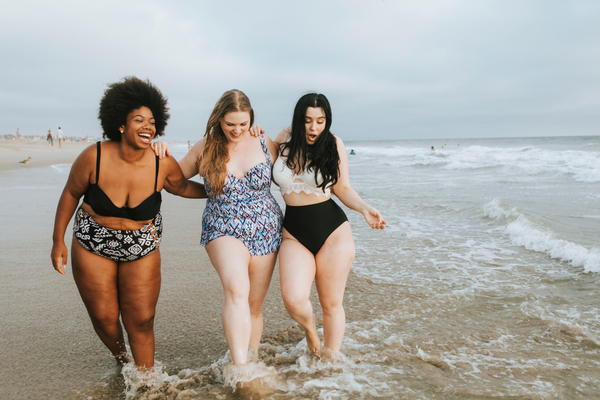“The summer body archetype is typically viewed as a body that fits the idealized beauty standard, which is flat stomach, toned body, not a hint of cellulite or stretch marks,” says Mayra Mejia, the 36-year-old founder of a DC-based fat-positive community called Plush DMV, in an interview with Yahoo Life.
“It’s like this sort of pressure-y deadline to look different in the summer than you do in the winter. To look better, supposedly,” Kneeland tells Yahoo Life. “It’s centered around body-fat loss, about slimming down for the summer or getting more toned or lean.”
“Basically, it is a perpetually impossible to obtain body ideal.”
It’s the same body type that’s sold by diet culture and fitness marketing year-round, according to Body Neutral author Jessi Kneeland. However, the term communicates that the warmer weather of the summer season specifically calls for the peak form of this “homogenous” and “Eurocentric” figure.
“My goodness, I remember the concept of having to be ‘summer body’ ready since I was a child. From my peers in school talking about having to watch what they eat, to family members changing what we ate because summer was approaching,” says Mejia, adding, “I especially remember the commercials. They would ramp up as the weather got warmer and would insist that nothing is worse than being fat — especially in the summer.”
The term is something that Kneeland (who uses they/them pronouns) saw surface alongside the fitness industry itself. “Everyone was learning about fitness and how it can change your body,” they explain. “The whole bikini body thing started popping up as headlines in magazines and articles and everything as this idea that you should be getting in shape for summer because you’re going to want to wear a bikini or you’re going to be showing more skin.”
People’s insecurities were already preyed upon to market the fitness industry, as various bodies were deemed undesirable or unattractive for gyms, and meal plans and supplements were offered as the solution. However, brands and publications began to “take advantage of seasonal changes” specifically by buying into the idea of the summer body.
“It’s all just pretty predatory,” Kneeland says. “But it does make sense — given how many people feel insecure in swimsuit season or however many people feel insecure wearing shorts or a tank top — that they would have such a big push around summer.”
Why is it harmful?
Defining certain body types as ideal or as trends can “fuel anxiety, depression, low self-esteem, social anxiety and self-doubt,” according to New York-based therapist Eliza Davis. “A ‘summer body’ implies that to be able to enjoy summer or to be seen as attractive, bodies need to look a certain way. It fuels toxic beauty image ideals, encourages thinness and allows less flexibility with body positivity, neutrality or acceptance at any shape or size.”
Davis explains that it creates an expectation that leads people to be hyper-critical of themselves, and projects the idea that a body should change just as a seasonal wardrobe does. It communicates that people’s bodies aren’t acceptable as is, that “we need to be doing more” to alter them and normalizes “negative self-talk.”
Ultimately, this puts stress on the body and can even lead people to take drastic measures to appear a certain way in summer clothing and swimwear.
Challenging the ‘summer body’
Unsubscribing from diet culture may feel impossible in a society driven by it. However, Davis suggests taking small steps to lessen its noise, specifically on social media.
“Comparison is a huge factor of summer-body talk. We see others working toward a summer body and comparison can creep in and can leave us feeling like, ‘Well should I be doing that too?'” she explains. “Since social media plays such a large role with fueling this mindset, throughout this summer it could be extremely helpful to reflect on the people and accounts you follow. Think, ‘How does this page, influencer or account reflect body positivity?’ ‘When I’m done reading posts from this page, do I feel critical of myself or my body?'”
Jones says being “extremely intentional” about her feeds has “drastically” and positively impacted her relationship with her body. “I started following women whose bodies look like mine, women who are confident in bikinis regardless of their size, shape or cellulite, women who aren’t on a mission to get as small as possible before summer time. This made all the difference for me,” she says.
Kristina Zias is doing her part as a creator to cultivate an online space where followers are encouraged to feel confident in their bodies while showing some skin. “It’s so important for me to encourage my audience to wear the swimsuit, to have fun at the beach and to not miss out on memories because they aren’t loving their body at that moment,” she tells Yahoo Life. “I think we need to lead by example.”
She even expanded upon the body positivity that her platform provides by hosting an inclusive pool party with her Confident Collective co-founder Raeann Langas. “We wanted a place where women could come celebrate summer and their bodies exactly as they are with zero pressure to change,” Zias says.
Mejia agrees that these IRL body inclusive spaces are vital to challenging ideals. “Being in community with other people who have bodies similar to yours makes you realize that there was never anything wrong with your body in the first place,” she says. “We may never be able to get rid of the term ‘summer body,’ but we can make it obsolete by not waiting until we look a certain way to wear certain things, to do certain activities, basically living a fully unapologetic summer. Your summer body is your body. Period.”
—
Photo Credit: Rawpixel.com / Shutterstock.com
